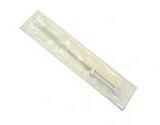For individuals, friends and families who are need to connect during life's challenging times. Share personal experiences, evaluate information and get support in a confidential, caring environment.
Sponsored Links
Main Menu
Healthy Sex
- Contraceptive Failure
- Birth Control Comparisons
- Contraceptive Failure Rates for Teens
- Human Reproduction
- STD Prevention
- Sexual Abstinence
Contraception For Women
- Barrier Contraceptives
- Oral Contraceptive Pills
- Hormonal Contraceptives
- Intrauterine Devices
- Female Sterilization
- Essure Micro-Insert
Contraception For Men
Natural Family Planning
- Download basal body temperature charts
- Sympto-Thermal Method
- Standard Days Method
- Breastfeeding for Birth Control
Ineffective Contraception
Abortion
Online Resources
What is Implanon?
Implanon is a hormonal method of contraception that is implanted in a woman’s arm and designed to last up to three years. Like other hormonal methods of contraception Implanon works by preventing ovulation so the woman does not produce an egg each month. Implanon also works by changing the mucus of the cervix making it thicker so sperm has a harder time getting through and by changing the lining of the uterus so it is not thick enough for implantation.
Implanon is 99% effective in preventing pregnancy. That means only about one woman in 100 becomes pregnant while using Implanon.
Because Implanon is a hormonal method that is positioned under the skin in the arm, it must be inserted by a health care provider. Insertion is a simple procedure done in the clinic or Doctor’s office and requires a small incision. Insertion is usually done within the first five days of the woman’s menstrual cycle-within five days after starting her period and a back up method of contraception should be used for the first seven days after Implanon insertion until it becomes effective. After insertion a woman can and should feel for the implant under the skin regularly to make sure it is in place.
It is important to remember that Implanon does not offer protection against HIV or sexually transmitted diseases so if the woman who is using Implanon is not in a monogamous relationship, condoms should be used as well.
Women should not use Implanon if they:
- • Smoke
- • May be pregnant or are pregnant
- • Are prone to blood clots
- • Have a history of liver disease
- • Have a history of breast cancer
- • Have a history of irregular vaginal bleeding
For others, Implanon is relatively safe, though there is some risk of side effects. Implanon is designed to last three years. When the three years is up, she needs to have the Implanon removed and another inserted if she wants to continue with Implanon as her method of contraception.
Implanon is also 100% reversible. If a woman desires pregnancy prior to the three year usage, she can have it removed and fertility returns. Some women have become pregnant very soon after having Implanon removed.
If long term, reversible contraception is what a woman is looking for, Implanon may be a good method to consider.
Sponsored Links
Related Articles
Support Groups
The information provided on Contracept.org is designed to support, not replace, the relationship that exists between a patient/site visitor and his/her health professional. This information is solely for informational purposes and does not constitute the practice of medicine. We encourage all visitors to see a licensed physician or nutritionist if they have any concerns regarding health issues related to diet, personal image and any other topics discussed on this site. Neither the owners or employees of Contracept.org nor the author(s) of site content take responsibility for any possible consequences from any treatment, procedure, exercise, dietary modification, action or application of medication which results from reading this site. Always speak with your primary health care provider before engaging in any form of self treatment. Please see our Legal Statement for further information.









